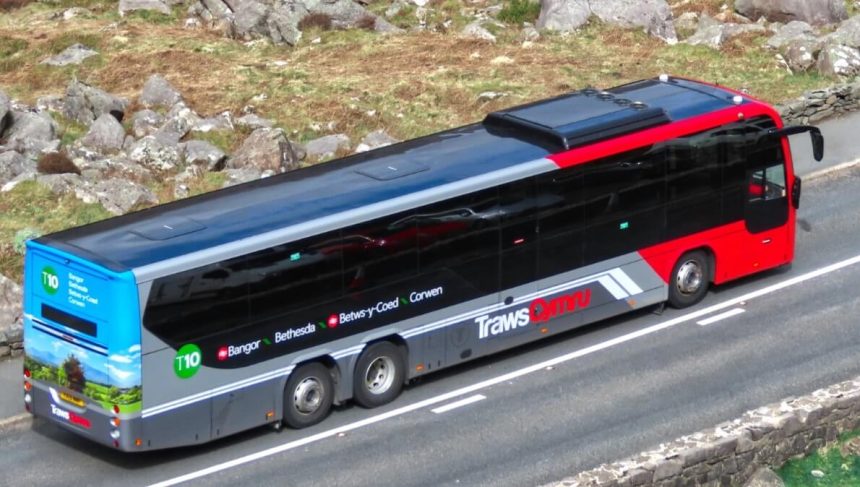A new express coach service linking the south to north of the western spine of Wales could be introduced by Transport for Wales (TfW) as early as the second quarter of 2026.
The subsidised “TrawsCymru Express” – as it is referred to in a newly released feasibility study prepared by Arup – would connect Bangor in north west Wales and Carmarthen in the south west.
Arup now proposes a full business case be carried out with a view to delivering the plan as a trial before the next Senedd election in May 2026.
The 130-mile journey could be covered in four hours 45 minutes, slashing one and a half hours off the current frequent-stop bus service, the T1/T2 by TrawsCymru. No direct rail link currently exists between the two settlements, with trains possible via Shrewsbury taking six hours 20 minutes.
The proposal is for seven towns to be served en route. The preferred option is for eight services per day each way, with departures made from 0530hrs to 1930hrs.
The report notes that procurement options would need to align with plans for bus franchising, due to be rolled out from 2026-28. Arup thus recommends TfW purchases vehicles for the TrawsCymru Express and lease them. Operators would maintain the vehicles as laid out in the franchise contract, which would also “define service specification, frequency, quality, customer care requirements, financial arrangements and risk allocation”.
Contract types under review would include “deficit coverage”, where the operator keeps fare revenue and may receive subsidy to cover any deficit. Net-cost and gross-cost contract are also given as options.
The paper notes ambitions to restore former railway services along this corridor but adds that a previous report prepared by WSP “concluded that the introduction of end-to-end schemes for rail would be very challenging due to the costs associated with rail infrastructure and overall distance requirements”. Coach is seen by Arup to be substantially cheaper.
The authors of the proposal recommend used diesel coaches would operate initially and, if the service proves successful, electric coaches could be used as early as the end of 2027. Standalone charging infrastructure would be created at each end of the route. Hydrogen full cell has been ruled out as a viable option in the short term.
The TrawsCymru Express would use existing stops but also part of the plan are improvements to those, as well as a new transport interchange at Machynlleth. The latter is in keeping with the plan’s adherence to the principle of integration with existing rail services.
Projected costs, revenues and subsidies have been fully broken down year by year. However, the diesel model for the first typical year of 2027 – after the initial £4.6 million outlay of 2026 – shows a revenue of £0.9 million and a subsidy of £2.0 million.



























